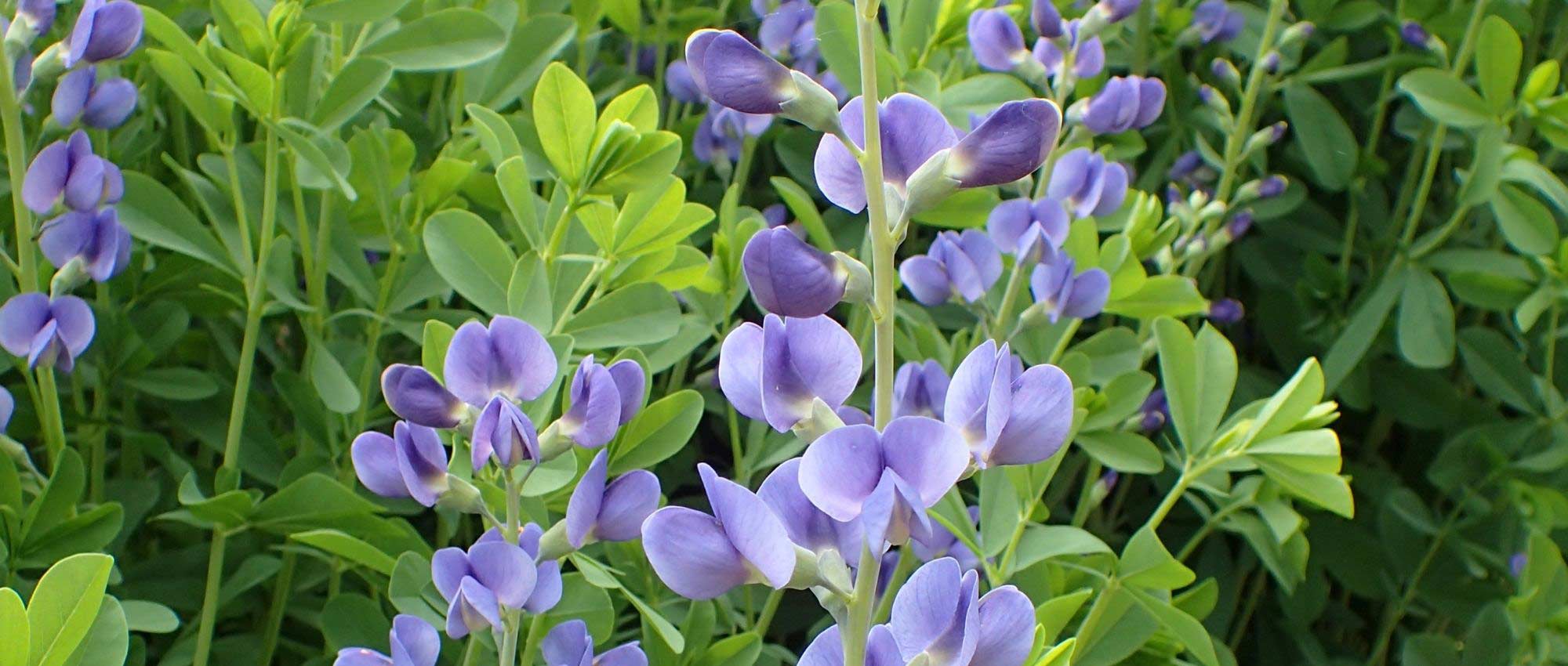
Baptisia: 7 ideas for successful planting combinations
Discover which plants to combine it with!
Contents
Baptisia, or false indigo, is a perennial that produces beautiful flowers gathered in long upright spikes between May and July. They are often blue in colour, as in Baptisia australis, but there are also varieties with yellow, white, purple, brown or even bicoloured flowers!
Baptisia is also valued for its attractive blue-green foliage, divided into three leaflets and deciduous. It is an airy-looking plant that adds volume to borders and combines easily with other perennials and annuals to create colourful displays!
Discover in this fact sheet 7 ideas to pair it with other plants in the garden and create pretty early-summer scenes.
In a cottage garden
With their light, generous foliage, Baptisias will integrate easily into a cottage garden. Prefer a variety with soft tones, such as the Baptisia ‘Purple Smoke’, which offers a very airy flowering in blue-violet hues, a colour both soft and deep. To accompany it, we recommend favouring plants with blue, mauve or white flowers, which will give a very harmonious effect. Cottage gardens create a sense of plant opulence by combining plants with generous foliage and a multitude of flowers in soft hues. With its delicate campanulate flowers, Campanula persicifolia will blend beautifully into this type of garden! You can pair it with delphiniums, centaureas, lupins… Baptisia also pairs very well with the elegant white flowers of camassias. We particularly recommend the variety Camassia leichtlinii ‘Alba Semiplena’, which is double-flowered. Finally, climbing plants such as clematis will also find their place in this type of garden.
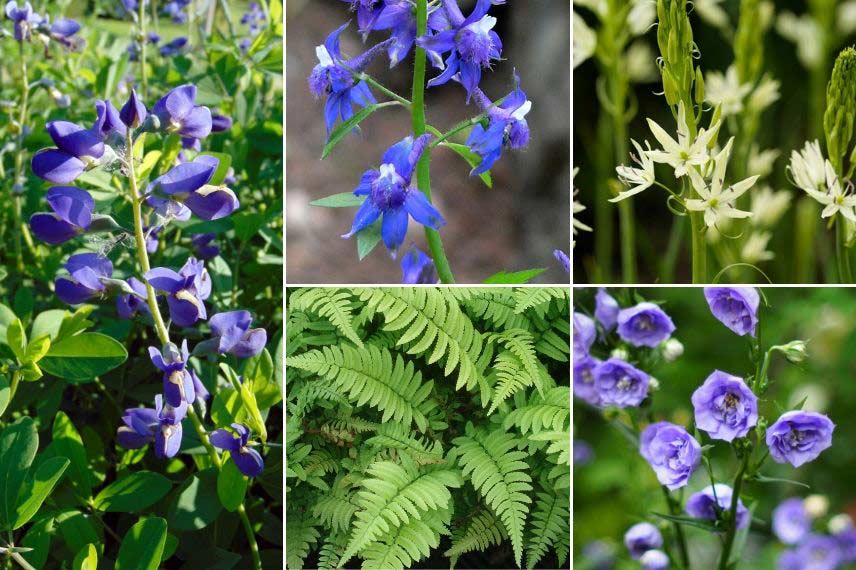
An idea for a planting combination to compose a cottage garden: Baptisia ‘Purple Smoke’, Delphinium bakeri (photo Stan Shebs), Camassia leichtlinii ‘Alba’ (photo J.M. van Berkel), Dryopteris cycadina, Campanula persicifolia ‘La Belle’ (photo M’s photography)
In a romantic flower border with roses
As Baptisia offer delicate flowering and very light foliage, they can be part of a beautiful romantic scene. Choose varieties with white or very soft flowers, such as the Baptisia australis ‘Alba’, or Baptisia ‘Pink Truffles’, with soft pink flowers. Plant some bushes, hydrangeas, spireas and, of course, roses at the back of the border! Plant foxgloves, penstemons, bleeding hearts, hardy geraniums, Phlox subulata in front of them… Enjoy the very airy white flowering of gypsophilas! They produce a multitude of small white flowers from June to August. Also discover the superb Phlomis tuberosa ‘Amazone’, which offers upright flowering stems bearing whorls of soft mauve flowers. Ideally, also install a small arbour or a trellis on which you can train climbing roses or clematis.
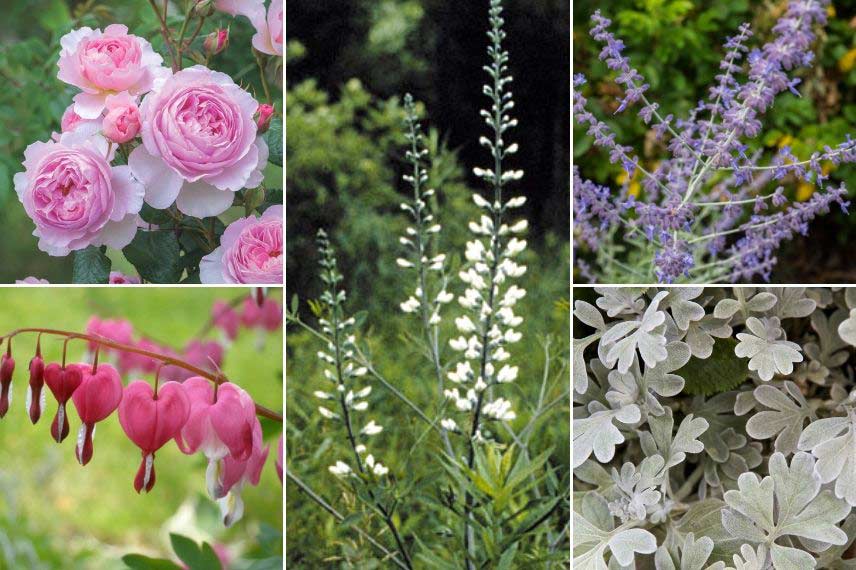
Baptisias with white flowers are perfect in romantic-style gardens. David Austin rose ‘The Ancient Mariner’, Dicentra spectabilis, Baptisia alba var. macrophylla (photo Blue Canoe), Perovskia atriplicifolia ‘Filagran’ (photo F. D. Richards), Artemisia stelleriana ‘Boughton Silver’
Discover other Baptisia
View all →Available in 1 sizes
Available in 1 sizes
Available in 0 sizes
Available in 1 sizes
Available in 1 sizes
Available in 1 sizes
Available in 1 sizes
Available in 1 sizes
Available in 1 sizes
Available in 1 sizes
In a naturalistic garden
Take inspiration from nature to incorporate Baptisia into your garden! Choose, for example, the type species Baptisia australis, with blue flowers, and plant it in an area of garden you rarely tend, leaving it fairly wild. Create a space with tall herbs and wildflowers where biodiversity can reclaim its place! You can include Cirsium, knapweeds, cornflowers, yarrows, campanulas, hardy geraniums… Choose delicate flowers that will bring small touches of colour. Also favour plants with a loose, flowing habit that move with the wind! You can include tall ornamental grasses, such as molinia, deschampsia or calamagrostis. Baptisia is also wonderful for accompanying the blue flowering of meadow sage, Salvia pratensis. It is an easy, hardy perennial found in the wild in France! Moreover, its melliferous flowers will attract pollinating insects.
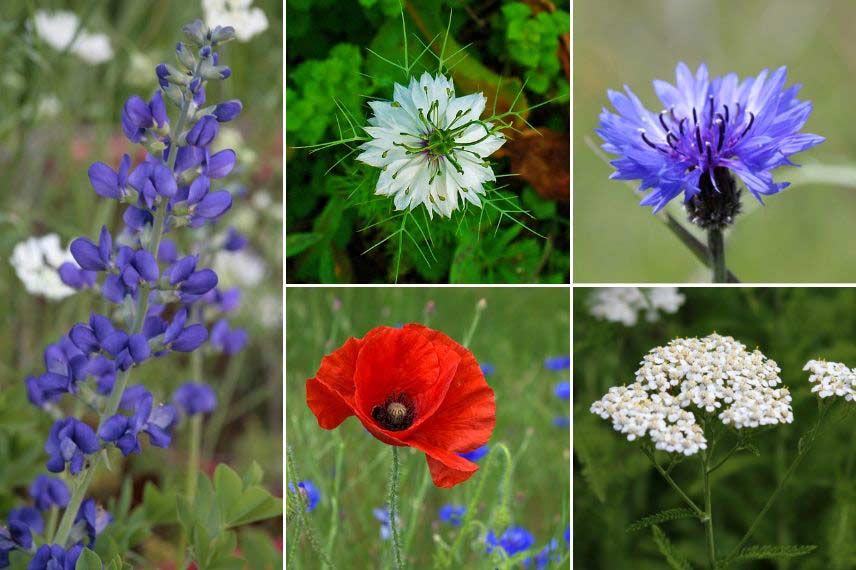
To create a wild, natural-style garden: Baptisia australis, love-in-a-mist (photo H. Zell), cornflower (photo Björn S.), poppy, yarrow (photo Bogdan Giuşcă)
In a contemporary garden
Baptisia will also find its place in a contemporary, graphic garden. In that case, we recommend choosing a white-flowered variety, such as Baptisia australis ‘Alba’, or opting for a more unusual variety, such as ‘Dutch Chocolate’, with purplish-brown flowers. Include plants with graphic foliage to create a very green backdrop: ferns, hostas, bamboos, horsetails… You can also include a few globe-shaped bushes; they will lend rigour and structure. And ornamental grasses, such as Hakonechloa macra, Stipa pennata or Carex. To accompany Baptisia’s flowering, include other perennials that offer flowers in sober, soft tones: white-flowered agapanthus, Gaura lindheimeri, Eucomis, black-flowered aquilegia ‘Black Barlow’, Echinops… Also consider Eremurus himalaicus, which produces tall, white, highly architectural flower spikes. You will achieve a chic, pared-back garden!
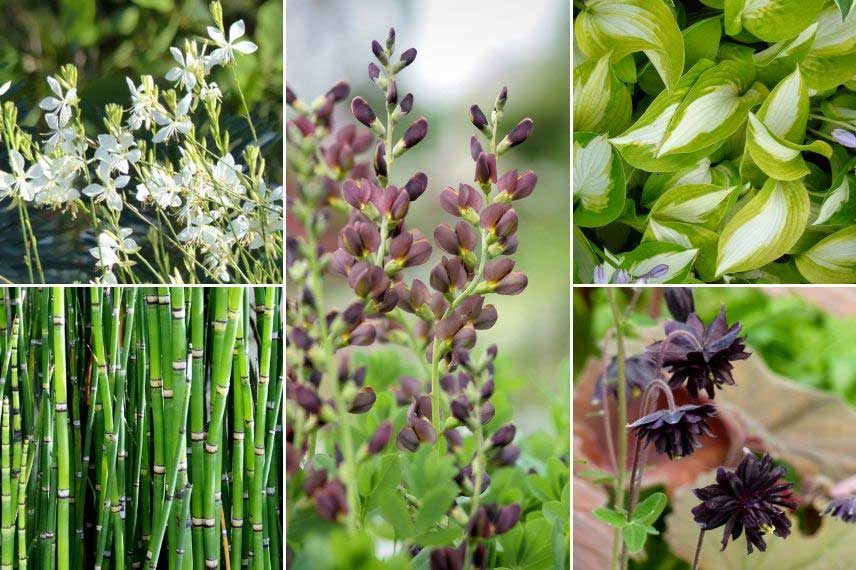
Dark- or white-flowered Baptisias fit easily into a graphic, modern planting scheme. Gaura lindheimeri ‘Snowbird’, Equisetum hyemale, Baptisia ‘Dutch Chocolate’, Hosta ‘Summer Music’, Aquilegia ‘Black Barlow’
In a Mediterranean-style garden
As Baptisia is drought-tolerant and copes well with poor soils, it can be used in a dry garden or rockery, alongside other undemanding plants. Choose, for example, Eryngiums, euphorbias, Achilleas, Perovskia, Salvia nemorosa ‘Caradonna’… Also consider the bright flowers of helianthemums, those dwarf shrubs that are covered from spring through late summer with flowers in vivid shades: yellow, pink, red, orange… Include Verbascum for their tall, architectural flower spikes. To add small touches of colour, consider rose campion, or Lychnis coronaria, which offers silvery foliage and deep, vivid pink flowers.
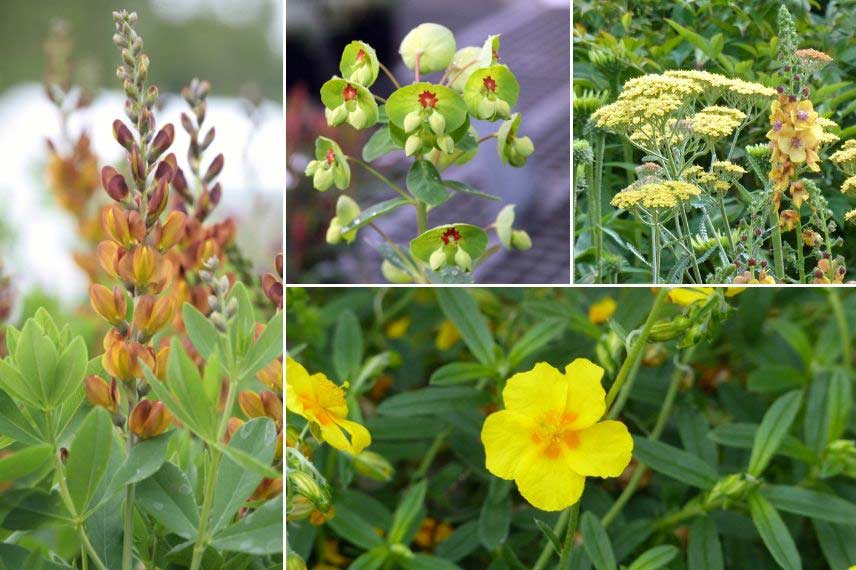
For a dry, Mediterranean-style garden: Baptisia ‘Brownie Points’, Euphorbia martinii (photo David J. Stang), Verbascum ‘Helen Johnson’ and Achillea ‘Terracotta’, Helianthemum ‘Ben Fhada’
To add brightness and colour to a flower bed!
Yellow-flowered Baptisia varieties are ideal for bringing brightness alongside plants with darker or duller foliage. Choose, for example, Baptisia ‘Carolina Moonlight’ or ‘Lemon Meringue’. Pair it with Phormiums, Ajuga reptans, Bergenia, Physocarpus, or purple Sedum (‘Purple Emperor’, for example), to create a striking contrast that will make its yellow flowers stand out! It will immediately add vitality and dynamism to your border. You can also use Baptisia to create a very colourful mixed border, for example by pairing it with Coreopsis, Achillea, Penstemon, Geum, Hemerocallis… Don’t hesitate to choose a Baptisia with bicoloured flowers, such as the variety ‘Cherries Jubilee’. You will get a lively, bright summer border!
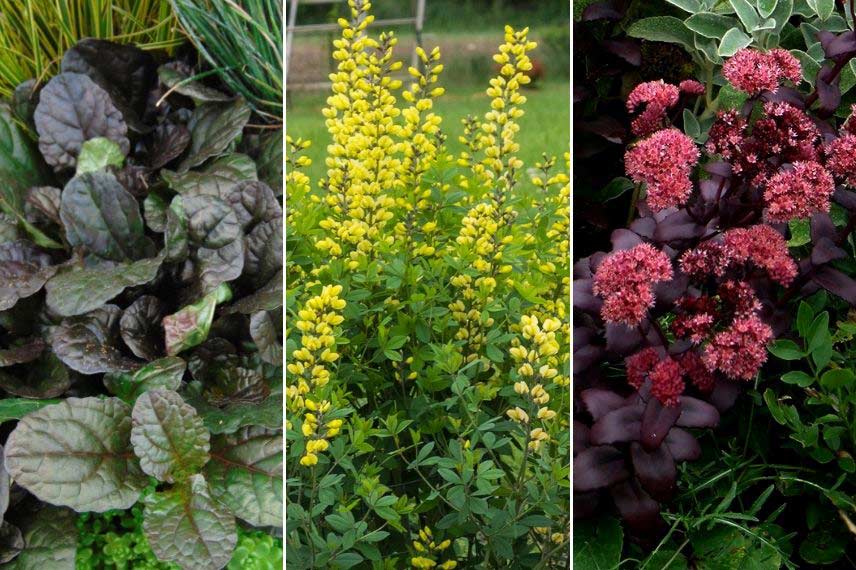
Baptisia also helps to brighten a border amid darker foliage. Ajuga reptans ‘Black Scallop’, Baptisia ‘Lemon Meringue’, Sedum ‘Purple Emperor’ (photo Peganum)
To add height and lighten a border
You can also use Baptisia to add some volume to a border! It has very light, airy foliage and forms a clump reaching between 1 m and 1.5 m in height. It will add height to a border that is a little too flat, made up of relatively low-growing plants such as hostas, Bergenia, alchemillas, hardy geraniums… The divided leaves of Baptisia bring an airy effect alongside these plants with broader, denser leaves, which would tend to weigh down the border. Baptisia’s flowering also contributes to adding even more lightness! For this we recommend the variety ‘Starlite Prairieblues’, with pale blue and white flowers.
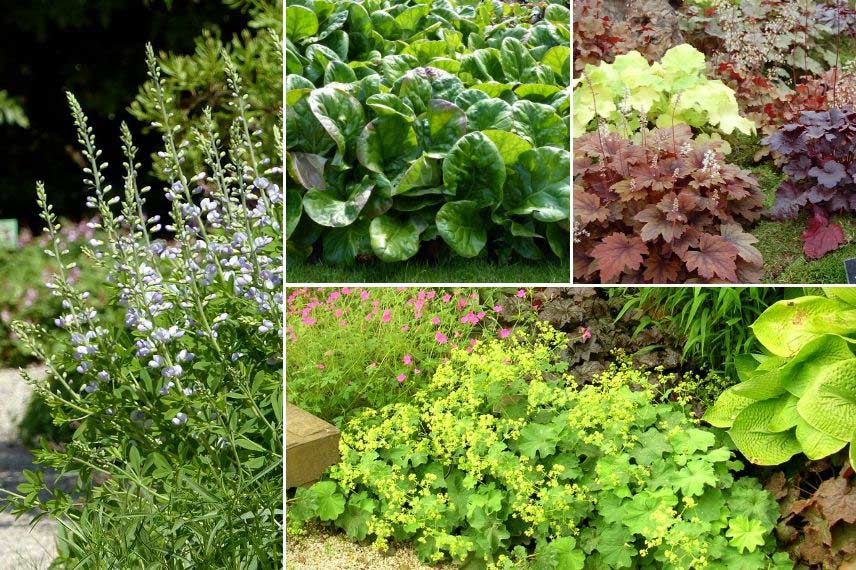
To add more volume and lightness to a border: Baptisia ‘Starlite PrairieBlues’ / Bergenia ciliata / Heucheras (photo Andy Mabbett) / Alchemilla, hardy geranium ‘Dilys’ and hosta
- Subscribe!
- Contents
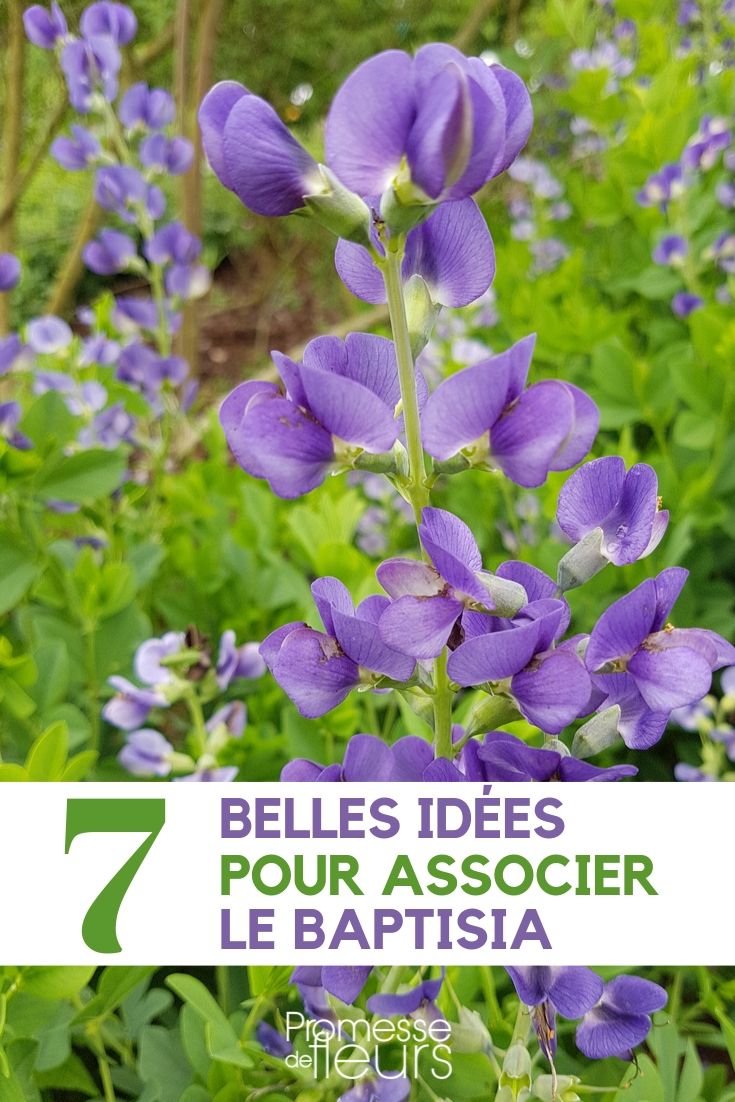






























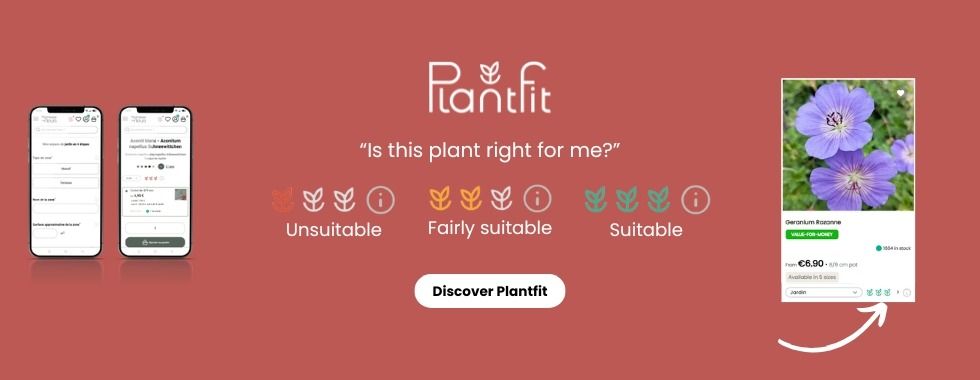
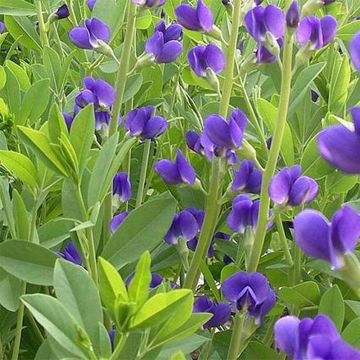
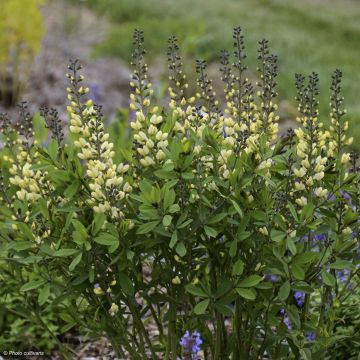
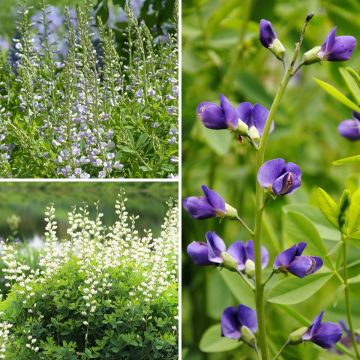
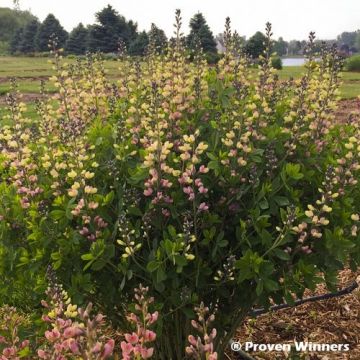
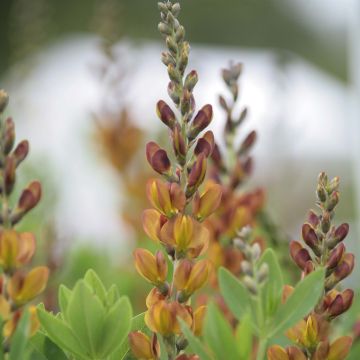
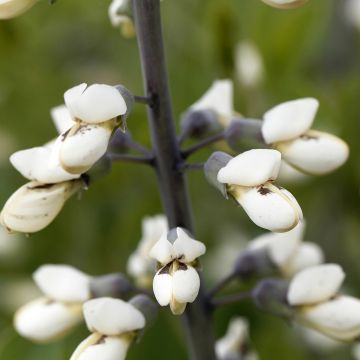
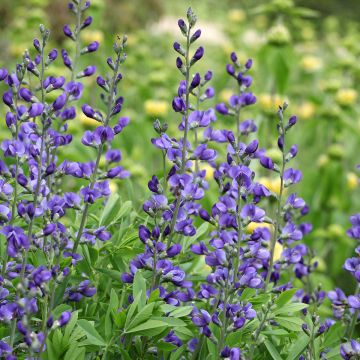
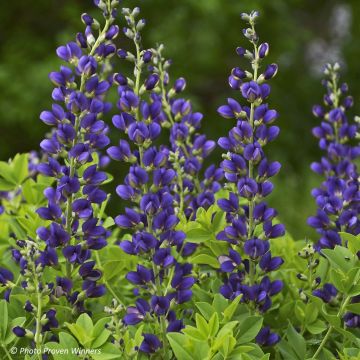
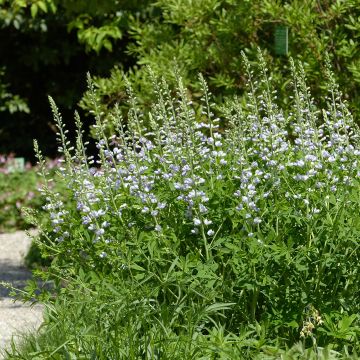
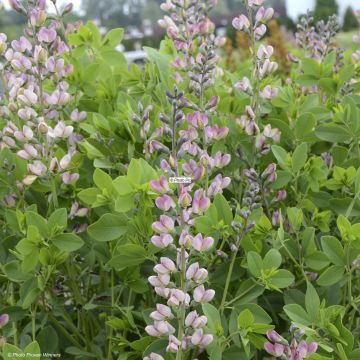
Comments